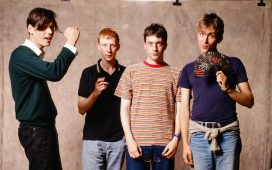If you find yourself lost in the catacomb-like basement of London’s Southbank Centre on a weekend, you’ll probably stumble across Gary Crosby holding court, addressing a circle of teenagers on everything from the history of reggae in the Caribbean diaspora to British jazz in the 1980s.
On the sweltering Saturday I meet him, Crosby is running 20 young musicians through the waypoints of Jamaican jazz, from Haitian carnival rhythms to poet Louise Bennett-Coverley’s patois, via the Skatalites and Bob Marley. He paces around the room while the students eagerly tap away on their phones – not texting but taking notes. Then he launches into a dub-laden take on the Herbie Hancock standard Cantaloupe Island.

There is a quietly commanding quality to Crosby, which is perhaps down to his four decades as a bassist. In the mid-1980s, he co-founded the Jazz Warriors, a group that showcased the early careers of seminal musicians such as saxophonist Courtney Pine and vibes player Orphy Robinson. In the 90s, Crosby led a renowned weekly jam session at Camden’s Jazz Cafe. Now 64, he has spent so long cradling his instrument that he has taken on its soothingly resonant qualities, exuding an easygoing charm. Last month, he became the first jazz recipient of the Queen’s Medal for Music, adding to his OBE and topping off what he calls “the best and the worst 18 months of my life”.
Life has not always run smoothly for Crosby. Born to Windrush-generation parents, he grew up in a disaffected black community in London. “There was black power happening, there was talk of Babylon, and a lot of young black men had to be intimidating because inside they were terrified of what might happen if they let their guard down.” He had his own brush with the law at 15, when he was arrested on suspicion of carrying cannabis during a police raid at a Soho club and, as a child, placed under house arrest. He was not charged, but while stuck at home, he discovered jazz. “I remember one night when everyone was out and Ella Fitzgerald came on the TV,” he says. “Her voice sent this rush of feeling through me, and since then I’ve been hooked on pursuing that in jazz.”
He took up the bass, and went on to ascend to a central position in the late-80s black jazz revival spearheaded by the likes of Pine. Yet it wasn’t until 1991 that Crosby gained a sense of purpose. “I [had been] in Jamaica, and one of my closest friends was smoking a huge spliff, blowing plumes of it into my face, and he kept asking me, ‘What you doing when you get back to England?’ I told him I had a gig at Ronnie Scott’s, but he kept asking the same question. I finally realised that I wasn’t doing anything – I was being selfish with my career and I needed to help the younger musicians.”
Back in London, Crosby and his partner, Janine Irons, set up Tomorrow’s Warriors, to encourage a greater diversity of young musicians to enter jazz. In the 28 years since the free programme – now based at the Southbank Centre – started, they have mentored thousands of musicians. Alumni include the saxophonist and rapper Soweto Kinch, and many London jazz artists including Theon Cross, Nubya Garcia and the Mercury prize-nominated Cassie Kinoshi.

The London jazz revival of the past few years, “feels special because there’s no arrogance about it. These kids just want to play,” he says. “I don’t give a shit about the ‘London jazz scene’ – I just want more musicians to be able to create a lasting career and leave something behind.”
The question of a legacy has been on Crosby’s mind since he suffered a near-fatal stroke in January 2018. “For three days I was really in a bad way. Knowing everything can go in a flash has given me so much more drive to finish what I started.” That means lobbying for arts funding – something he feels is as essential as the NHS – as well as passing on the reins of Tomorrow’s Warriors to the next generation. “I haven’t been able to play much myself since the stroke,” he says. “So I need to think about my own music now, because I’ve put that aside for 30 years.”

Crosby says it was a difficult decision to accept his Queen’s Medal. “I haven’t always been in favour of the royal family,” he says. “But I spoke to all of my friends about it and realised that I’m not accepting it for me. It’s for Tomorrow’s Warriors, and for anything to get more funds and to raise its profile I need to turn up and put on that suit.”
That suit will be donned again this month when Crosby’s recently formed Nu Civilisation Orchestra, made up of Tomorrow’s Warriors alumni, headline a Proms concert at the Royal Albert Hall. “This is the future of the music: creating an orchestra that can hopefully gain a residency and keep people employed for years to come,” he says. “We need to not get distracted with the political bullshit but trust in the music – that’s where the humanity lies.”
• Prom 54: Duke Ellington’s Sacred Music is at Royal Albert Hall, London, on 29 August.














